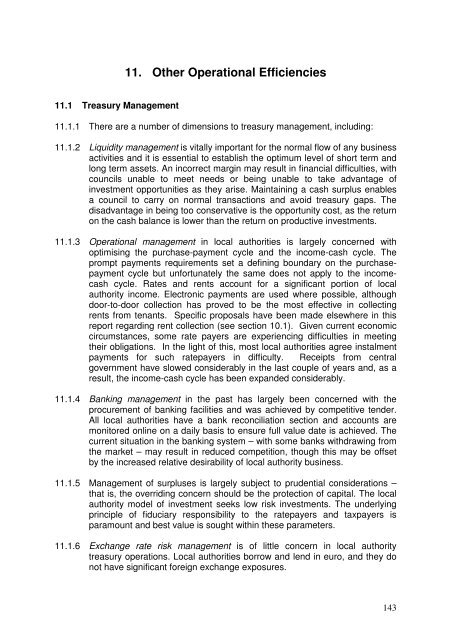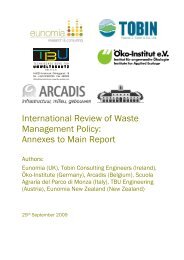Report of the Local Government Efficiency Review Group
Report of the Local Government Efficiency Review Group
Report of the Local Government Efficiency Review Group
Create successful ePaper yourself
Turn your PDF publications into a flip-book with our unique Google optimized e-Paper software.
11.1 Treasury Management<br />
11. O<strong>the</strong>r Operational Efficiencies<br />
11.1.1 There are a number <strong>of</strong> dimensions to treasury management, including:<br />
11.1.2 Liquidity management is vitally important for <strong>the</strong> normal flow <strong>of</strong> any business<br />
activities and it is essential to establish <strong>the</strong> optimum level <strong>of</strong> short term and<br />
long term assets. An incorrect margin may result in financial difficulties, with<br />
councils unable to meet needs or being unable to take advantage <strong>of</strong><br />
investment opportunities as <strong>the</strong>y arise. Maintaining a cash surplus enables<br />
a council to carry on normal transactions and avoid treasury gaps. The<br />
disadvantage in being too conservative is <strong>the</strong> opportunity cost, as <strong>the</strong> return<br />
on <strong>the</strong> cash balance is lower than <strong>the</strong> return on productive investments.<br />
11.1.3 Operational management in local authorities is largely concerned with<br />
optimising <strong>the</strong> purchase-payment cycle and <strong>the</strong> income-cash cycle. The<br />
prompt payments requirements set a defining boundary on <strong>the</strong> purchasepayment<br />
cycle but unfortunately <strong>the</strong> same does not apply to <strong>the</strong> incomecash<br />
cycle. Rates and rents account for a significant portion <strong>of</strong> local<br />
authority income. Electronic payments are used where possible, although<br />
door-to-door collection has proved to be <strong>the</strong> most effective in collecting<br />
rents from tenants. Specific proposals have been made elsewhere in this<br />
report regarding rent collection (see section 10.1). Given current economic<br />
circumstances, some rate payers are experiencing difficulties in meeting<br />
<strong>the</strong>ir obligations. In <strong>the</strong> light <strong>of</strong> this, most local authorities agree instalment<br />
payments for such ratepayers in difficulty. Receipts from central<br />
government have slowed considerably in <strong>the</strong> last couple <strong>of</strong> years and, as a<br />
result, <strong>the</strong> income-cash cycle has been expanded considerably.<br />
11.1.4 Banking management in <strong>the</strong> past has largely been concerned with <strong>the</strong><br />
procurement <strong>of</strong> banking facilities and was achieved by competitive tender.<br />
All local authorities have a bank reconciliation section and accounts are<br />
monitored online on a daily basis to ensure full value date is achieved. The<br />
current situation in <strong>the</strong> banking system – with some banks withdrawing from<br />
<strong>the</strong> market – may result in reduced competition, though this may be <strong>of</strong>fset<br />
by <strong>the</strong> increased relative desirability <strong>of</strong> local authority business.<br />
11.1.5 Management <strong>of</strong> surpluses is largely subject to prudential considerations –<br />
that is, <strong>the</strong> overriding concern should be <strong>the</strong> protection <strong>of</strong> capital. The local<br />
authority model <strong>of</strong> investment seeks low risk investments. The underlying<br />
principle <strong>of</strong> fiduciary responsibility to <strong>the</strong> ratepayers and taxpayers is<br />
paramount and best value is sought within <strong>the</strong>se parameters.<br />
11.1.6 Exchange rate risk management is <strong>of</strong> little concern in local authority<br />
treasury operations. <strong>Local</strong> authorities borrow and lend in euro, and <strong>the</strong>y do<br />
not have significant foreign exchange exposures.<br />
143
















